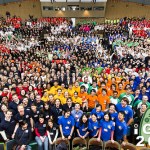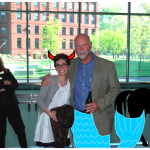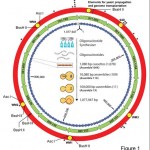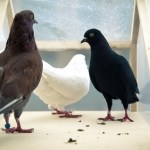future
"Prediction is very difficult, especially if it's about the future." -Niels Bohr
What's going to happen next? It's perhaps the most important thing to know if we want to be prepared for practically anything in our lives. And without even thinking about it, most of us are actually very good at this in a huge number of aspects of our lives. For example...
Image credit: Crazy Adventures in Parenting.
I was hungry at work today, and I was prepared for it. Somehow, I knew that I was going to need food throughout the course of the day, and so I was prepared for it by bringing food from…
"It is always wise to look ahead, but difficult to look further than you can see." -Winston Churchill
We've come a long way in this Universe. Over the past 13.7 billion years, we've formed the light elements out of a sea of protons and neutrons, cooled and expanded to form neutral atoms for the first time, gravitationally collapsed hydrogen and helium gas clouds to form the first stars, borne witness to generations of stellar deaths and rebirths, lived through the formation of hundreds of billions of galaxies and the clustering together of thousands or more galaxies into clusters, filaments,…
First of all, I owe y'all an apology for the radio silence. Somehow this month I've felt a deep need for some quiet, rest and offlineness. It was quite an autumn here - it started with the destruction of Irene and Lee (and dealing with those disasters are still a major part of life in our community although they've faded from public focus), included the usual autumn and holiday rush, our usual sequence of family events and birthday parties (three kids have birthday in six weeks, right after the high holidays wind up), ASPO, my book, two foster placements and the loss of M., and the wind up…
I'm obviously always a fan of Greer's work, but I thought this week's post was particularly apt - he addresses the larger question of whether we must keep up industrial civilization until it falls apart (note, I do not say "if it falls apart" - implicit in the keeping up is that it brings us faster to collapse), or whether we can change.
George Monbiot, who's carved out a niche for himself as the staff pseudoenvironmentalist of The Guardian, had a blog post of his own on much the same theme. His argument is simply that most people in today's industrial societies are not going to accept…
Beautiful video imagining the future of augmented, prosthetic sight, by Superflux for the Human+ exhibition:
Song of the Machine from Superflux on Vimeo.
You can read more about the science behind retinal prosthetics in a great article in the Guardian by one of the project collaborators, Dr. Patrick Degenaar.
This week's project is getting the material up for my garden plants and herb CSA - I'm hoping to be able to offer a wide variety of plants from annual vegetables (my tomato list alone is insane) to unusual edibles, native plants, flowers and herbs. My garden obsession is making me a little nuts right now, since there are still 3 feet of snow on the ground and its about 12 degrees right now - nuts enough that I came up with this: my secret garden that can be planting in plain sight without anyone...not the neighbors, not the zoning board, knowing that it all (shhhhh!) delicious food plants!
I…
I had been mulling over precisely how to frame this piece for a while, when I read Erik Lindberg's "This Is a Peak Oil Story." which admirably gets at the essential point that I've been wanting to make - that our collective crisis comes to all of us at different times and different ways than we imagined, and that exemptions are only rarely granted. Lindberg writes eloquently of his own experience of trying to undertake change - and failing in large part because of the precise circumstances he is trying to address:
I had imagined the rooftop farm thriving far into the future. Here, my…
I had a great conversation with Maggie Koerth-Baker from BoingBoing for bloggingheads.tv Science Saturday. We talked about all sorts of sciency stuff, including her upcoming book on the challenges of renewable energy, synthetic biology, the similarities between cheese and the human body, women in science/blogging, and octopus brains. I had a lot of fun chatting with Maggie and I learned a lot, and I hope you will too!
Synthetic biologists work on designing living cells, but engineered bacteria don't usually come up when you think of "designer" things. This year however, a synthetic biology design is up for a Brit Insurance Design of the Year award, up against the Lanvin Spring collection, Angry Birds, and Rock Band 3! Designers Daisy Ginsberg and James King worked in collaboration with the 2009 Cambridge iGEM team (including awesome blogger Lab Rat) to imagine ways that people could use bacteria engineered to produce pigments in the future. Check out their video about the science and design of E. chromi:
Yesterday I mentioned Symbiotic Households, an art project imagining genetically engineered mosquitoes that provide mood stabilizing compounds to a population plagued by worries caused by climate change. Today on twitter I saw a link to a US patent application filed by Microsoft about engineering parasites to monitor and maintain human health. The possible engineered parasites covered in the application include:
mosquitoes, fleas, ticks, bed bugs (Cimicidae Cimex lectularius), midges (such as Ceratopogonidae), other blood sucking arthropods, annelids or leeches, nematodes such as Ascaris…
With The Symbiotic Household, Elliott P. Montgomery seeks to find answers to problems caused by climate change. Low-cost, low energy solutions are proposed through complex genetic engineering of domesticated insects--"What better way to deal with a future need than with a future technology?"
The project is deliberatively provocative; "By offering a problematic answer, I want to encourage viewers to question the entire scenario and thereby take part in the discussion." What do you think?
via we make money not art
It's been a few weeks since the iGEM jamboree, a whirlwind, completely exhausting weekend of student synthetic biology projects. This tweet from Robin Sloan from the #igem2010 stream is a pretty good way to sum up the weekend:
.bbpBox987719207489536 {background:url(http://a3.twimg.com/profile_background_images/3386569/giant2.jpg) #777f88;padding:20px;} p.bbpTweet{background:#fff;padding:10px 12px 10px 12px;margin:0;min-height:48px;color:#000;font-size:18px !important;line-height:22px;-moz-border-radius:5px;-webkit-border-radius:5px} p.bbpTweet span.metadata{display:block;width:100%;clear:…
It is tempting to despair of all action. And sometimes those who despair are right. But sometimes they aren't. And this, I think is an important and central point for everyone who hits those moments when they simply don't believe society will self-correct in any measure from its impending ecological disaster. I should be clear - I don't believe it will self-correct in every measure, or even as much as I wish desperately it would. But I also do not believe that what one does to mitigate suffering, soften impacts, make life livable or plan for a better outcome is wasted.
I'd tell you why…
Professor Daniel Zajfman, president of the Weizmann Institute of Science, is a physicist in the fields of atomic and molecular physics. He has a strong interest in the popularization of science
George Mallory, the man who almost made it to the top of Everest, is probably most famous for his terse reply when asked why he attempted to climb it: "Because it's there." Scientists often resemble mountain climbers: We want to understand nature because it's there. Why, in today's world, should we be devoting precious resources to finding out what happened in the Universe's first billionth of a…
I wrote this post in 2008, which was one of my worst gardening years ever - I made the insane mistake of setting the deadline for _A Nation of Farmers_ for June 1, which meant I spent most of the planting season in front of my computer. But I knew I wasn't the only one, and I've come to worry a lot less about it - because an awesome fall garden is worth a lot. BTW, not entirely coincidentally, I'm going to teach a 4 week online, asynchronous class on fall gardening during the month of July, beginning Tuesday, July 6. The class will help you either get started or begin to make use of fall…
In 2006 when I first met Julian Darley, author of _High Noon for Natural Gas_ and the founder of the Post-Carbon Institute, the world was excited by then-famous "Jack" oil field find in the Gulf of Mexico. Both of us were watching the way the world was interpreting the data - people were claiming that there might be 10, 12, 15 billion barrels of oil - five miles down underneath the ocean. The media was excited, ignoring the fact that large oil field potential reserves are routinely revised - and almost always downwards. The public and the media, without enough knowledge of oil production…
The reaction to the Venter Institute's synthetic genome transplantation has been decidedly mixed. Is this the beginning of something new and wonderful, the ability to really design organisms from scratch? Is it something more sinister, the beginning of a dark era where techno-corporate (or terrorist) interests can design something that will destroy the environment in catastrophic ways? Is it just a technical advance or a conceptual breakthrough? A philosophical revolution? Is it a Big Deal or big whoop? Synthetic biology has never been just one thing and still has many different goals, with a…
The J. Craig Venter Institute has just announced the creation of the first bacterial cell controlled by a genome that is entirely chemically synthesized (PDF). The group has been working towards this goal for several years now, first working out how to synthesize and assemble such large pieces of DNA and how to transplant a genome from one organism to another. This result puts it all together, a synthetic version of the genome of the bacterium Mycoplasma mycoides and transplantation into a Mycoplasma capricolum cell. This synthetic cell is almost identical to a natural M. mycoides, but also…
Are aliens little green men of unpredictable motives? Horrible insect-like face-hugging, chest-exploding monsters? Are they super-smart, super-slimy, super-fishy, body-cavity-probing, disc-flying creatures, searching for planets to colonize and people to destroy as Stephen Hawking warned, or are they something much more mundane? Could there be alien life already on earth, too microscopic, too different to notice? Could life on earth have been seeded from an alien land, with secret messages encoded in our DNA? We've been scanning the sky for extraterrestrial radio signals for years, should we…
I'm a little late in posting about the recent work of Tuur Van Balen, a Belgian designer who uses art and design to explore the boundaries between people and technology. His work has explored synthetic biology and biotechnology for years, and I first was introduced to his work through news of his Urban Biogeography project. A recent focus in synthetic biology has been the design of simple biosensors, strains of bacteria or yeast that can sense an environmental pollutant and produce a measurable output such as color change. Thanks to the work of several very creative iGEM teams, the Registry…







